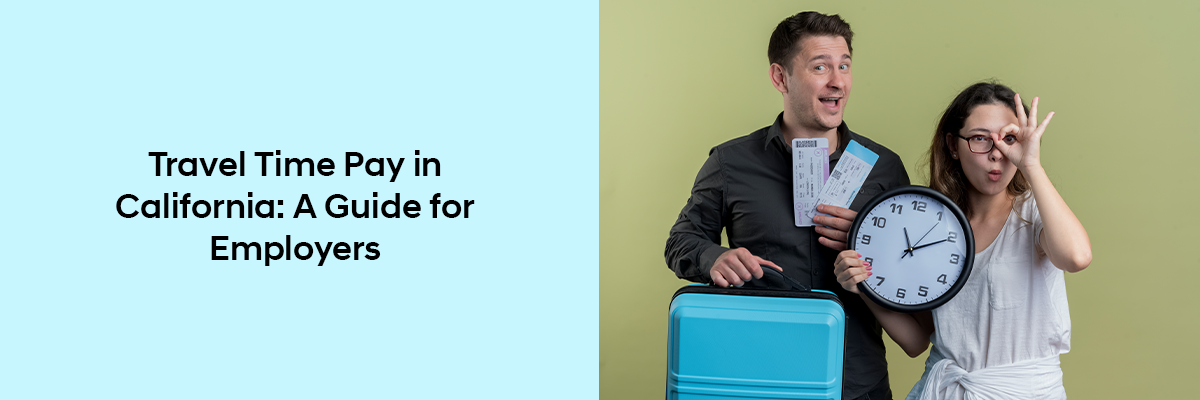In California, employers must navigate a complex set of wage and hour rules, and one area that often creates confusion is travel time pay.
While commuting to work isn’t generally considered paid time, certain types of travel may be compensable under California labor laws.
Failure to properly compensate employees for travel time can lead to costly wage claims, penalties, and even class-action lawsuits.
This guide breaks down what travel time pay is, when it applies, and how employers can stay compliant.



1. Understanding Travel Time Pay in California
Under the California Labor Code and the Industrial Welfare Commission (IWC) Wage Orders, employees must be paid for all hours worked, and this includes certain travel activities. The key question is: Is the travel part of the employee’s work duties or required by the employer?
If the answer is yes, that travel time is compensable.
2. Travel Time That Must Be Paid
California law identifies several situations where employers must pay for travel time:
a. Travel During the Workday
If employees must travel as part of their normal work duties, such as visiting clients, making deliveries, or traveling between job sites, the time is paid.
Example: A construction worker who drives from one job site to another during the day must be compensated for that travel time.
b. Travel to Remote Work Locations
If an employee is required to report to a remote worksite far from their usual work location, the additional travel time beyond their normal commute is paid.
c. Overnight or Out-of-Town Travel
When employees travel out of town for work, travel time that cuts across their normal working hours is compensable, even if it occurs on a non-working day.
Example: If an employee normally works 9 a.m. to 5 p.m., and travels on a Sunday from 10 a.m. to 2 p.m. for a Monday meeting, that travel time is paid.
d. Employer-Provided Transportation
If employees are required to use company-provided transportation, such as a shuttle from a central meeting point to the job site, that time is compensable.
3. Travel Time That Is Not Paid
California follows the general principle that ordinary commuting time, from home to the regular workplace and back, is not compensable. This applies unless:
- The employee is performing work duties during the commute.
- The employer imposes restrictions or requirements on the commute (e.g., must transport equipment, or must report to a meeting point).
4. How to Calculate Travel Time Pay
When travel time is compensable, it must be paid at the employee’s regular rate of pay. If the travel causes the employee to work more than 8 hours in a day or 40 hours in a week, overtime rates apply.
Employers should:
- Track start and end times for travel.
- Include travel hours in payroll records.
- Apply overtime rules where necessary.
5. Reimbursement for Travel Expenses
California Labor Code Section 2802 requires employers to reimburse employees for necessary travel expenses incurred in the course of their work, including mileage, parking, tolls, and lodging. This is separate from travel time pay and must be provided in addition to wages.
You can read more about the difference between Travel time pay and mileage reimbursement.
6. Compliance Tips for Employers
To avoid legal issues, California employers should:
- Have a clear travel policy that explains what counts as paid travel time.
- Train managers and supervisors on when to authorize travel and how to record it.
- Maintain accurate timekeeping for all work-related travel.
- Reimburse expenses promptly to comply with state law.
You can read more about whether employers have to pay for meals while traveling.
7. Penalties for Non-Compliance
Failure to pay travel time properly can lead to:
- Back pay for unpaid wages.
- Interest and penalties.
- Claims for unpaid overtime.
- Potential class-action lawsuits.
The California Labor Commissioner enforces these rules strictly, so proactive compliance is critical.
Explore a range of payroll accounting training webinars to stay updated, compliant, and ahead.
Final Thoughts
Travel time pay in California is more than just a wage and hour technicality, it’s a compliance requirement that protects employees and shields employers from costly disputes.
By understanding when travel is compensable, accurately tracking time, and reimbursing travel expenses, employers can stay compliant while maintaining positive employee relations.


